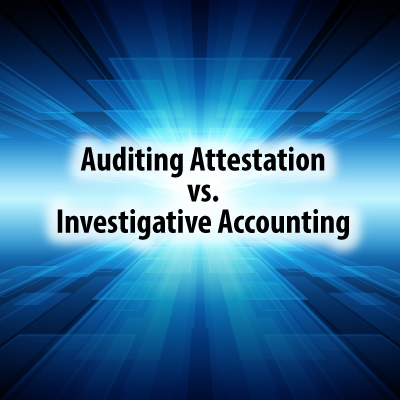 A Certified Public Accountant (CPA) is an accounting professional who has passed the Uniform CPA examination and has met all additional state certification and experience requirements. This is done by acquiring the necessary college credits by studying accounting, economics, statistics, and business. Generally, they do not have any training or experience in criminal law and the development of evidence of fraud—either oral or written.
A Certified Public Accountant (CPA) is an accounting professional who has passed the Uniform CPA examination and has met all additional state certification and experience requirements. This is done by acquiring the necessary college credits by studying accounting, economics, statistics, and business. Generally, they do not have any training or experience in criminal law and the development of evidence of fraud—either oral or written.
In contrast, a Treasury Department—Internal Revenue Service—Special Agent is a professional investigator, generally with a degree in accounting, and possibly a CPA. This individual is trained in income tax law, procedure, and other federal law violations, including money laundering, Ponzi schemes, advanced fees schemes, structuring, and other financial crimes. They are trained to recognize fraudulent activities, and how to use indirect methods of proof to prove unreported income, because they seldom see a set of books. They are trained in how to interview taxpayers and witnesses to develop evidence, and how to write memorandums of interview, Special Agent Reports, and search warrants. They learn over their career how to work with the United States Attorney’s office and other State and Federal agencies, and they testify before Federal grand juries and in Federal and State Courts. In addition, Special Agents are trained and skilled in the development of willfulness and intent, which is a key element in proving criminal violations of the Internal Revenue Code. Intent is developed by statements and actions of the taxpayer and is generally determined through inference drawn from circumstantial evidence.
Retired Special Agents are specifically suited to proving civil torts. They are instrumental in divorces in community property states, using their skills to analyze bank records and follow money to locate hidden assets, trace funds of separate and community property, and to help inventory and divide the marital estate. They can be used to analyze and follow money in an estate and trust matter where the trustee takes money for his personal use and deprives the other family members of their share as dictated in the will. They can be used by attorneys as an expert witness to assist in proving theft by a partner or a corporate financial officer. They can use their knowledge of indirect methods to help defend a subject of a Title 31, structuring case by analyzing tax returns and comparing them to the filed income tax returns to show that only legal income was structured, and although a strict liability standard applies, convince the agent and Assistant US Attorney that the client did not intentionally violate the law and had a defense. They can use their knowledge, experience, and skill to help defend subjects involved in complex financial investigations being considered for prosecution by an active IRS Special Agent by helping develop defenses. They can develop information of acceptance of responsibility by the return preparer, CPA; demonstrate that the case would be de minimus; and that the taxpayer did not have the necessary intent to prove willfulness.
A retired Special Agent has more to offer that just a CPA certificate, he was among the first to be considered a “forensic accountant” before the term became prominent and Certified Fraud Examiners were trained beyond accounting by the Association of Certified Fraud Examiners.
If you or your client needs a knowledgeable retired IRS Special Agent, fraud investigator, and forensic accountant call Edmond J. Martin Chief Investigator, at Sage Investigations, LLC call 512-659-3179 or email edmartin@sageinvestigations.comand visit our website at www.sageinvestigations.com. Sage Investigations is not a CPA firm and does not do audits or attestation of financial statements. If you need the services of a CPA in your fraud investigation we are associated with some very competent and experienced CPAs.


 Call
Call